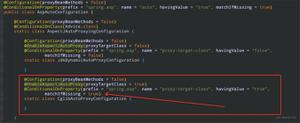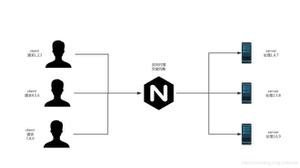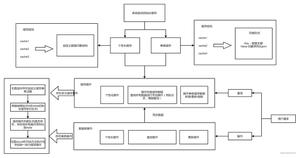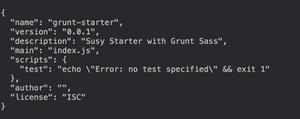SpringBoot 源码解析 (一)----- SpringBoot核心原理入门
本文内容纲要:
- Spring Boot 概述- 什么是 Spring Boot
- 使用 Spring Boot 有什么好处
- Spring Boot HelloWorld
- 导入依赖spring boot相关的依赖
- 编写主程序
- 编写Controller、Service
- 运行主程序测试
- Hello World探究
- POM文件
- 启动器
- 主程序类(主入口类)
Spring Boot 概述
**Build Anything with Spring Boot:**Spring Boot is the starting point for building all Spring-based applications. Spring Boot is designed to get you up and running as quickly as possible, with minimal upfront configuration of Spring.
上面是引自官网的一段话,大概是说: Spring Boot 是所有基于 Spring 开发的项目的起点。Spring Boot 的设计是为了让你尽可能快的跑起来 Spring 应用程序并且尽可能减少你的配置文件。
什么是 Spring Boot
- 它使用 “习惯优于配置” (项目中存在大量的配置,此外还内置一个习惯性的配置,让你无须手动配置)的理念让你的项目快速运行起来。
- 它并不是什么新的框架,而是默认配置了很多框架的使用方式,就像 Maven 整合了所有的 jar 包一样,Spring Boot 整合了所有框架
使用 Spring Boot 有什么好处
回顾我们之前的 SSM 项目,搭建过程还是比较繁琐的,需要:
- 1)配置 web.xml,加载 spring 和 spring mvc
- 2)配置数据库连接、配置日志文件
- 3)配置家在配置文件的读取,开启注解
- 4)配置mapper文件
- .....
而使用 Spring Boot 来开发项目则只需要非常少的几个配置就可以搭建起来一个 Web 项目,并且利用 IDEA 可以自动生成生成
- 划重点:简单、快速、方便地搭建项目;对主流开发框架的无配置集成;极大提高了开发、部署效率。
Spring Boot HelloWorld
导入依赖spring boot相关的依赖
<?xml version="1.0" encoding="UTF-8"?><project xmlns="http://maven.apache.org/POM/4.0.0" xmlns:xsi="http://www.w3.org/2001/XMLSchema-instance"
xsi:schemaLocation="http://maven.apache.org/POM/4.0.0 http://maven.apache.org/xsd/maven-4.0.0.xsd">
<modelVersion>4.0.0</modelVersion>
<groupId>cn.chenhao</groupId>
<artifactId>springboot</artifactId>
<version>1.0.0-SNAPSHOT</version>
<packaging>jar</packaging>
<name>springboot</name>
<description>Demo project for Spring Boot</description>
<parent>
<groupId>org.springframework.boot</groupId>
<artifactId>spring-boot-starter-parent</artifactId>
<version>2.0.1.RELEASE</version>
<relativePath/>
</parent>
<dependencies>
<dependency>
<groupId>org.springframework.boot</groupId>
<artifactId>spring-boot-starter-web</artifactId>
</dependency>
</dependencies>
<build>
<plugins>
<plugin>
<groupId>org.springframework.boot</groupId>
<artifactId>spring-boot-maven-plugin</artifactId>
</plugin>
</plugins>
</build>
</project>
编写主程序
/** * @SpringBootApplication来标注一个主程序类,说明这是一个SpringBoot应用
*/
@SpringBootApplication
public class HelloWorldMainApplication {
public static void main(String[] args) {
//Spring应用启动
SpringApplication.run(HelloWorldMainApplication.class, args);
}
}
编写Controller、Service
@RestControllerpublic class HelloController {
@RequestMapping("/hello")
public String hello(){
return "Hello world";
}
}
运行主程序测试
使用maven打包命令将其打包成jar包后,直接使用命令:
java -jar xxx.jarHello World探究
POM文件
父项目
<parent> <groupId>org.springframework.boot</groupId>
<artifactId>spring-boot-starter-parent</artifactId>
<version>2.0.1.RELEASE</version>
<relativePath/>
</parent>
其父项目是
<parent> <groupId>org.springframework.boot</groupId>
<artifactId>spring-boot-dependencies</artifactId>
<version>2.0.1.RELEASE</version>
<relativePath>../../spring-boot-dependencies</relativePath>
</parent>
该父项目是真正管理Spring Boot应用里面的所有依赖的版本:Spring Boot的版本仲裁中心,所以以后导入的依赖默认是不需要版本号。如下

还有很多版本号没有截图出来
启动器
<dependency> <groupId>org.springframework.boot</groupId>
<artifactId>spring-boot-starter-web</artifactId>
</dependency>
spring-boot-starter : spring boot场景启动器;帮助导入web模块正常运行所依赖的组件;
Spring Boot将所有的功能场景抽取出来,做成一个个的starter(启动器),只需要在项目中引入这些starter,那么相关的场景的所有依赖都会导入进项目中。要用什么功能就导入什么场景的启动器。
<dependency> <groupId>org.springframework.boot</groupId>
<artifactId>spring-boot-starter-tomcat</artifactId>
</dependency>
<dependency>
<groupId>org.springframework</groupId>
<artifactId>spring-web</artifactId>
</dependency>
<dependency>
<groupId>org.springframework</groupId>
<artifactId>spring-webmvc</artifactId>
</dependency>
添加了 spring-boot-starter-web 依赖,会自动添加 Tomcat 和 Spring MVC 的依赖
spring-boot-starter-web中又引入了spring-boot-starter-tomcat
主程序类(主入口类)
@SpringBootApplicationpublic class HelloWorldMainApplication {
public static void main(String[] args) {
//Spring应用启动
SpringApplication.run(HelloWorldMainApplication.class, args);
}
}
@SpringBootApplication
- Spring Boot应用标注在某个类上,说明这个类是SpringBoot的主配置类,SpringBoot就应该运行这个类的main方法来启动SpringBoot应用。
注解定义如下:
@SpringBootConfiguration@EnableAutoConfiguration
@ComponentScan(excludeFilters = {
@Filter(type = FilterType.CUSTOM, classes = TypeExcludeFilter.class),
@Filter(type = FilterType.CUSTOM, classes = AutoConfigurationExcludeFilter.class) })
public @interface SpringBootApplication {}
@SpringBootConfiguration
- Spring Boot的配置类
- 标注在某个类上,表示这是一个Spring Boot的配置类
注解定义如下:
@Configurationpublic @interface SpringBootConfiguration {}
其实就是一个Configuration配置类,意思是HelloWorldMainApplication最终会被注册到Spring容器中
@EnableAutoConfiguration
- 开启自动配置功能
- 以前使用Spring需要配置的信息,Spring Boot帮助自动配置;
- @EnableAutoConfiguration通知SpringBoot开启自动配置功能,这样自动配置才能生效。
注解定义如下:
@AutoConfigurationPackage@Import(EnableAutoConfigurationImportSelector.class)
public @interface EnableAutoConfiguration {}
@AutoConfigurationPackage
自动配置包注解
@Import(AutoConfigurationPackages.Registrar.class)
public @interface AutoConfigurationPackage {}
@Import(AutoConfigurationPackages.Registrar.class):默认将主配置类(@SpringBootApplication)所在的包及其子包里面的所有组件扫描到Spring容器中。如下
@Order(Ordered.HIGHEST_PRECEDENCE)static class Registrar implements ImportBeanDefinitionRegistrar, DeterminableImports {
@Override
public void registerBeanDefinitions(AnnotationMetadata metadata,
BeanDefinitionRegistry registry) {
//默认将会扫描@SpringBootApplication标注的主配置类所在的包及其子包下所有组件
register(registry, new PackageImport(metadata).getPackageName());
}
@Override
public Set<Object> determineImports(AnnotationMetadata metadata) {
return Collections.<Object>singleton(new PackageImport(metadata));
}
}
@Import(EnableAutoConfigurationImportSelector.class)
EnableAutoConfigurationImportSelector: 导入哪些组件的选择器,将所有需要导入的组件以全类名的方式返回,这些组件就会被添加到容器中。
1 //EnableAutoConfigurationImportSelector的父类:AutoConfigurationImportSelector 2 @Override
3 public String[] selectImports(AnnotationMetadata annotationMetadata) {
4 if (!isEnabled(annotationMetadata)) {
5 return NO_IMPORTS;
6 }
7 try {
8 AutoConfigurationMetadata autoConfigurationMetadata = AutoConfigurationMetadataLoader
9 .loadMetadata(this.beanClassLoader);
10 AnnotationAttributes attributes = getAttributes(annotationMetadata);
11 List<String> configurations = getCandidateConfigurations(annotationMetadata, attributes);
12 configurations = removeDuplicates(configurations);
13 configurations = sort(configurations, autoConfigurationMetadata);
14 Set<String> exclusions = getExclusions(annotationMetadata, attributes);
15 checkExcludedClasses(configurations, exclusions);
16 configurations.removeAll(exclusions);
17 configurations = filter(configurations, autoConfigurationMetadata);
18 fireAutoConfigurationImportEvents(configurations, exclusions);
19 return configurations.toArray(new String[configurations.size()]);
20 }
21 catch (IOException ex) {
22 throw new IllegalStateException(ex);
23 }
24 }
我们主要看第11行List<String> configurations = getCandidateConfigurations(annotationMetadata, attributes);会给容器中注入众多的自动配置类(xxxAutoConfiguration),就是给容器中导入这个场景需要的所有组件,并配置好这些组件。我们跟进去看看
protected List<String> getCandidateConfigurations(AnnotationMetadata metadata, AnnotationAttributes attributes) {
List<String> configurations = SpringFactoriesLoader.loadFactoryNames(
getSpringFactoriesLoaderFactoryClass(), getBeanClassLoader());
//...
return configurations;
}
protected Class<?> getSpringFactoriesLoaderFactoryClass() {
return EnableAutoConfiguration.class;
}
public static final String FACTORIES_RESOURCE_LOCATION = "META-INF/spring.factories";
public static List<String> loadFactoryNames(Class<?> factoryClass, ClassLoader classLoader) {
String factoryClassName = factoryClass.getName();
try {
//从类路径的META-INF/spring.factories中加载所有默认的自动配置类
Enumeration<URL> urls = (classLoader != null ? classLoader.getResources(FACTORIES_RESOURCE_LOCATION) :
ClassLoader.getSystemResources(FACTORIES_RESOURCE_LOCATION));
List<String> result = new ArrayList<String>();
while (urls.hasMoreElements()) {
URL url = urls.nextElement();
Properties properties = PropertiesLoaderUtils.loadProperties(new UrlResource(url));
//获取EnableAutoConfiguration指定的所有值,也就是EnableAutoConfiguration.class的值
String factoryClassNames = properties.getProperty(factoryClassName);
result.addAll(Arrays.asList(StringUtils.commaDelimitedListToStringArray(factoryClassNames)));
}
return result;
}
catch (IOException ex) {
throw new IllegalArgumentException("Unable to load [" + factoryClass.getName() + "] factories from location [" + FACTORIES_RESOURCE_LOCATION + "]", ex);
}
}
SpringBoot启动的时候从类路径下的 META-INF/spring.factories中获取EnableAutoConfiguration指定的值,并将这些值作为自动配置类导入到容器中,自动配置类就会生效,最后完成自动配置工作。EnableAutoConfiguration默认在spring-boot-autoconfigure这个包中,如下图

最终有96个自动配置类被加载并注册进Spring容器中

J2EE的整体整合解决方案和自动配置都在spring-boot-autoconfigure-xxx.jar中。在这些自动配置类中会通过@ConditionalOnClass等条件注解判断是否导入了某些依赖包,从而通过@Bean注册相应的对象进行自动配置。后面我们会有单独文章讲自动配置的内容
本文内容总结:Spring Boot 概述,什么是 Spring Boot,使用 Spring Boot 有什么好处,Spring Boot HelloWorld,导入依赖spring boot相关的依赖,编写主程序,编写Controller、Service,运行主程序测试,Hello World探究,POM文件,启动器,主程序类(主入口类),
原文链接:https://www.cnblogs.com/java-chen-hao/p/11829056.html
以上是 SpringBoot 源码解析 (一)----- SpringBoot核心原理入门 的全部内容, 来源链接: utcz.com/z/296509.html









